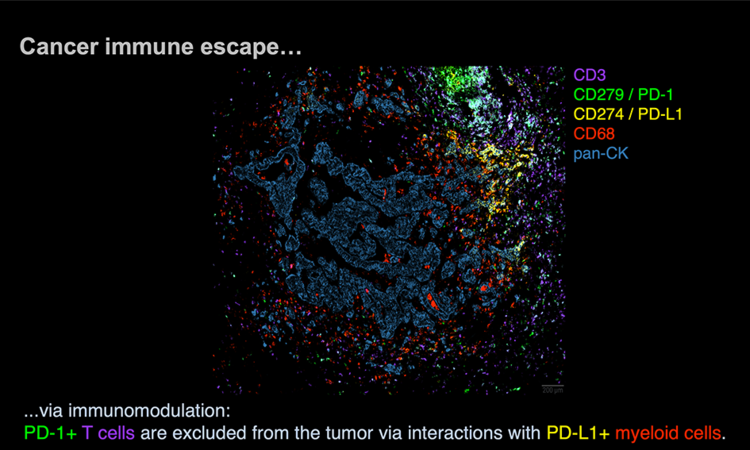Sie befinden sich hier
Inhalt
Immunomonitoring & Cancer Immunology
Clinical Cooperation Unit Dermato-Oncology
Cancer usually develops later in life as a result of uncontrolled growth of mutated cells that escape immune surveillance - a multi-facetted process of interactions between tissues and immune cells. Selective manipulation of some of these regulatory pathways has led to the breakthrough success of immune checkpoint blockade, first in melanoma and now in a growing number of other solid tumours. However, only a fraction of patients benefit from these first generation immunetherapies, highlighting the urgent need to better understand the mechanisms of cancer immune escape – but also to foster the develop novel and cancer specific treatment approaches.
That is why we are interested in the detailed investigation of the tumor microenvironment (TME), because this is where cancer immunosurveillance is modulated to a large extent. But also the determination of the immune cell composition in the periphery provides a good reflection of what is happening in the tumor and allows, for example, minimally invasive immune monitoring of clinical trials. We use a variety of immunomonitoring tools in combination with detailed clinical metadata to develop biomarker models that accurately predict clinical outcome in skin cancer.
As cancer rejection is largely ascribed to T cells, a major focus of our research is on the identification and functional investigation of T cell signatures recognizing tumor-associated antigens in skin cancer and their suppressive counterparts, such as myeloid derived suppressor cells (MDSCs), regulatory T cells and other immunosuppressive cell subsets. By studying these complex interaction patterns, we aim to gain new insights into mechanisms of cancer immunosurveillance and translate this knowledge into new therapeutic approaches.
As a member of the research consortium FOR2799 “Receiving and translating signals via the γδ T cell receptor", a major focus of our research is the investigation of the role of γδ T cells in cancer rejection under immune checkpoint blockade.
The collaboration with the Berlin Aging Study-II aims at distinguishing immune parameters of aging from cancer-associated features, as the occurrence of solid cancer is usually limited to older individuals
The CIMT (Association for Cancer Immunotherapy) Immunoguiding Program (CIP) guides the development of innvovative cancer immunotherapeutics through inter-laboratory harmonization and quality control education.
# https://www.cimt.eu/about-cip-1
Affiliations:
Klinische Kooperationseinheit Dermatoonkologie des Deutschen Krebsforschungszentrum Heidelberg (DKFZ) und der Klinik für Dermatologie, Venerologie und Allergologie, Medizinische Fakultät Mannheim, Ruprecht-Karls-Universität Heidelberg, Theodor-Kutzer-Ufer 1-3, 68167 Mannheim
Kontextspalte
Contact


